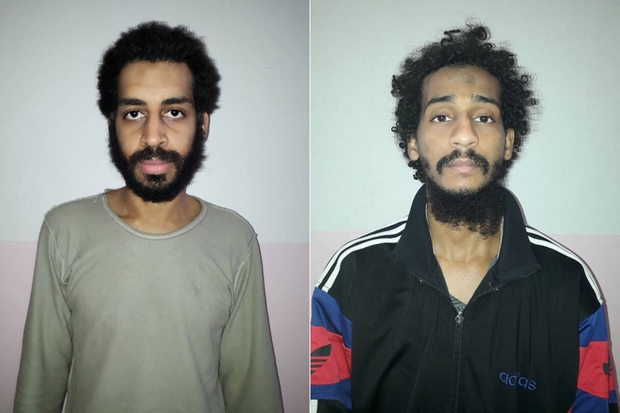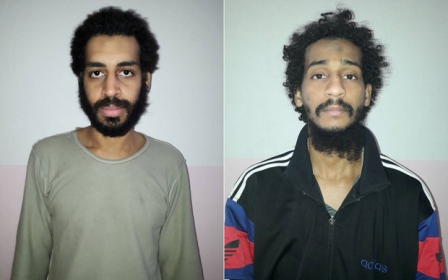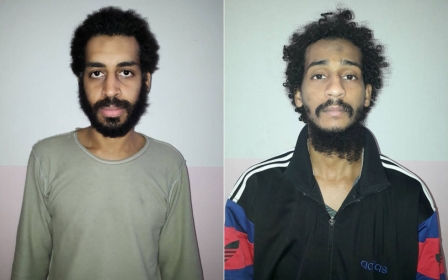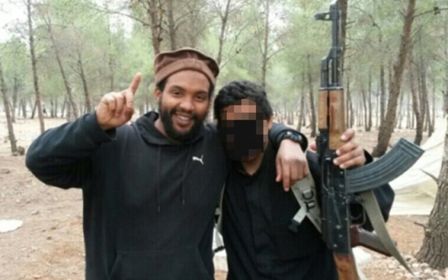UK dropped opposition to death penalty for IS suspects over Trump 'grudge' fears

The UK government abandoned its decades-old opposition to the death penalty in order to avoid angering senior figures in the Trump administration over the prosecution of terrorism suspects, the High Court in London heard on Monday.
It agreed to provide evidence it held against two alleged Islamic State murderers, without requiring assurances that the men would not be subject to the death penalty or consigned to the military detention facility at Guantanamo Bay in Cuba.
The two men, El Shafee El-Sheikh and Alexanda Kotey, are accused of being members of a group who kidnapped and beheaded 27 people, including the US citizens James Foley, Steven Sotloff and Peter Kassig, and two British aid workers, David Haines and Alan Henning.
The mother of El-Sheikh is seeking an injunction to prevent the UK from providing any further legal assistance to the US, with her lawyers arguing that to do so would be unlawful.
Lawyers for the British government are opposing her application, arguing that the UK’s long-standing opposition to the death penalty is not enshrined in law.
The court heard that two successive British home secretaries, Theresa May - now prime minister - and Amber Rudd, had insisted that the UK could assist with a prosecution in the US only if assurances over the death penalty and Guantanamo were given.
The current home secretary, Sajid Javid, abandoned that position in “an unreasonable and unlawful about-turn,” Edward Fitzgerald QC, counsel for El-Sheikh’s mother, Maha Elgizouli, told the court.
US wanted pair to stand trial in UK
Javid had been advised that the US government wanted the two men to be prosecuted in the UK. The British government says there is insufficient evidence to do so, a claim that Elgizouli’s lawyers dispute.
The US Attorney General Jeff Sessions had publicly expressed disappointment that the UK was declining to prosecute the two men, while at the same time attempting to instruct the US how to do so, the court heard.
In April, shortly before Javid made the decision to not seek death penalty assurances, Sir Kim Darroch, the UK ambassador to Washington, explained that the reaction of senior figures in the Trump administration was likely to be “close to outrage” if the UK insisted on the assurances being given, adding: “At worst, they will wind the president up to complain to the prime minister and, potentially, to hold a grudge.”
The court heard that the evidence against El-Sheikh includes 600 statements taken by British counter-terrorism detectives.
The UK’s foreign office took the view that any decision to hand over this evidence without seeking assurances would damage the UK’s ability to lobby against the imposition of the death penalty in future, and put British citizens at risk of reprisal attacks if executions followed.
Nevertheless, Boris Johnson, the foreign secretary at the time, concluded that in this “unique and unprecedented case” it was in the interests of the UK’s national security that no assurances should be sought, the court heard.
The two men were captured by Kurdish forces in northern Syria earlier this year. The court heard that they are now in US custody in Syria.
Deprived of citizenship
While both Londoners, the UK government quietly took steps to deprive them of their British citizenship in late 2014, after footage of the beheadings was posted on the internet.
Two other alleged members of the Islamic State murder squad were also British. One, Mohammed Emwazi, was killed in a US drone strike in 2015. The fourth, Aine Davis, is currently serving a seven-year jail sentence in Turkey after being convicted of membership of a terrorist organisation.
Together, the four men were known to their prisoners as “the Beatles” because of their English accents, according to a number of men who were eventually released.
None of the identities of the 600 people who have given statements to British police were disclosed in court.
The court has heard that the US will require that evidence in order to secure convictions, but Elgizouli’s lawyers say they have not been told why British prosecutors have concluded that the two men cannot be prosecuted in the UK.
Fitzgerald said that Elgizouli’s objection was to the death penalty and Guantanamo, and not to the prospect of her son facing justice.
“The claimant doesn’t come before the court to excuse the appalling acts of which her son is accused. She has not come to say he shouldn’t be appropriately punished.”
The case continues.
New MEE newsletter: Jerusalem Dispatch
Sign up to get the latest insights and analysis on Israel-Palestine, alongside Turkey Unpacked and other MEE newsletters
Middle East Eye delivers independent and unrivalled coverage and analysis of the Middle East, North Africa and beyond. To learn more about republishing this content and the associated fees, please fill out this form. More about MEE can be found here.




